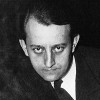“ Man, in so far as he is determined to a particular action because he has inadequate ideas, cannot be absolutely said to act in obedience to virtue; he can only be so described, in so far as he is determined for the action because he understands. ”
Baruch Spinoza, Ethics (1677). copy citation
| Author | Baruch Spinoza |
|---|---|
| Source | Ethics |
| Topic | obedience action |
| Date | 1677 |
| Language | English |
| Reference | |
| Note | Translated by R. H. M. Elwes |
| Weblink | http://www.gutenberg.org/files/3800/3800-h/3800-h.htm |
Context
“Q.E.D.
Corollary.—The effort for self—preservation is the first and only foundation of virtue. For prior to this principle nothing can be conceived, and without it no virtue can be conceived.
PROP. XXIII. Man, in so far as he is determined to a particular action because he has inadequate ideas, cannot be absolutely said to act in obedience to virtue; he can only be so described, in so far as he is determined for the action because he understands.
i.) , that is (III. Proof.—In so far as a man is determined to an action through having inadequate ideas, he is passive ( III. Deff. i., and iii.) , he does something, which cannot be perceived solely through his essence, that is (by IV.” source
Corollary.—The effort for self—preservation is the first and only foundation of virtue. For prior to this principle nothing can be conceived, and without it no virtue can be conceived.
PROP. XXIII. Man, in so far as he is determined to a particular action because he has inadequate ideas, cannot be absolutely said to act in obedience to virtue; he can only be so described, in so far as he is determined for the action because he understands.
i.) , that is (III. Proof.—In so far as a man is determined to an action through having inadequate ideas, he is passive ( III. Deff. i., and iii.) , he does something, which cannot be perceived solely through his essence, that is (by IV.” source



